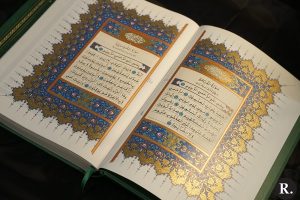
The Review of Religions is delighted to present the complete English translation of the comm
The Review of Religions is delighted to present the complete English translation of the commentary of Sūrah al-Ikhlāṣ – Chapter 112 of the Holy Qur’an – by Hazrat Mirza Bashiruddin Mahmud Ahmad (ra), translated into English for the first time.
Sūrah al-Ikhlāṣ, one of the shortest chapters in the Qur’an, discusses the unity of God, and so contains the essence of the entire Islamic teaching. Just as Sūrah al-Fātiḥah is considered to be an outline of the entire Qur’an, Sūrah al-Ikhlāṣ, together with the two succeeding chapters, Sūrah al-Falaq and Sūrah al-Nās, also contains the themes mentioned in Sūrah al-Fātiḥah. Indeed, in one tradition, the Holy Prophet (sa) stated that Sūrah al-Ikhlāṣ is equal to one-third of the Holy Qur’an.
This is one of the most insightful and in-depth commentaries of the Holy Qur’an ever written, and The Review of Religions has the honour of publishing it for our English readers for the first time.
By Hazrat Mirza Bashiruddin Mahmud Ahmad (ra), Second Worldwide Head of the Ahmadiyya Muslim Community
Translated by Murtaza Ahmad
Edited by The Review of Religions Translation Team
Upon the occasion of Hajjat al-Wada‘ [the last hajj, or pilgrimage to the Holy Ka’bah, taken by the Holy Prophet (sa)], the Holy Prophet (sa) addressed the Muslims and said:
إِنَّ أَمْوَالَكُمْ وَدِمَاءَكُمْ وَأَعْرَاضَكُمْ عَلَيْكُمْ حَرَامٌ كَحُرْمَةِ يَوْمِكُمْ هَذَا فِي بَلَدِكُمْ هَذَا فِي شَهْرِكُمْ هَذَا
After that, he stated:
أَلَا فَلْيُبَلِّغِ الشَّاهِدُ الْغَائِبَ
In other words, those Muslims who are in attendance, should listen to this message and then convey it to those who are not present: ‘Indeed your wealth, your blood and your honour are as impermissible to each other, as this day, this month, and this city is sacred.’[1]
I instructed our Community that whoever hears this teaching should convey it along to others because this was indeed the Holy Prophet’s (sa) command. So this instruction was also, in essence, like [the command to recite] قُلۡ [qul]. When this message has been conveyed from one person to the other, it has raised the sense of awareness within a people.
In summary, the words قُلۡ هُوَ ٱللَّهُ أَحَدٌ [Qul huwallāhu Aḥad], signify, ‘O Muslim who believes in My Existence, My Word, and of that especially which is in the Holy Qur’an: We instruct you to go to the people and proclaim that the essence of the teachings of Islam is that Allah is One.’
As we have indicated previously, the subject matter of Sūrah al-Fātiḥah has been explained in the last three chapters of the Holy Qur’an. In Sūrah al-Ikhlāṣ, the words قُلۡ هُوَ ٱللَّهُ أَحَدٌ are a reflection of the following words in Sūrah al-Fātiḥah:
اَلۡحَمۡدُ لِلّٰہِ رَبِّ الۡعٰلَمِیۡنَ الرَّحۡمٰنِ الرَّحِیۡمِ مٰلِکِ یَوۡمِ الدِّیۡنِ اِیَّاکَ نَعۡبُدُ وَاِیَّاکَ نَسۡتَعِیۡنُ اِھْدِنَا الصِّرَاطَ الۡمُسۡتَقِیۡمَ صِرَاطَ الَّذِیۡنَ اَنۡعَمۡتَ عَلَیۡھِمۡ
The verses
[اَلۡحَمۡدُ لِلّٰہِ رَبِّ الۡعٰلَمِیۡنَ … اِیَّاکَ نَعۡبُدُ وَاِیَّاکَ نَسۡتَعِیۡنُ اِھْدِنَا الصِّرَاطَ الۡمُسۡتَقِیۡمَ صِرَاطَ الَّذِیۡنَ اَنۡعَمۡتَ عَلَیۡھِمۡ]
denote the absolute unity of God and complete trust in Him. Complete trust in God is the result of believing in His absolute unity. When a person realises that there is nothing other than God, they can never rely on anybody but God.
If somewhere there is a medical doctor, a ḥakīm [practitioner of herbal medicine], an Ayurvedic practitioner and a homeopath, and the doctor’s treatment does not benefit the patient, their attendants or nurses would then run to the ḥakīm. And on seeing no benefit in his medicine, they would then try the Ayurvedic practitioner and then the homeopath.
And if there is more than one doctor practising in the same field, then the patient will anxiously consult one doctor, and then the other. However, if there is no one available, then nobody makes an effort to seek treatment.
The subject of the absolute unity of God is explained in the words,
اَلۡحَمۡدُ لِلّٰہِ رَبِّ الۡعٰلَمِیۡنَ … اِیَّاکَ نَعۡبُدُ وَاِیَّاکَ نَسۡتَعِیۡنُ اِھْدِنَا الصِّرَاطَ الۡمُسۡتَقِیۡمَ صِرَاطَ الَّذِیۡنَ اَنۡعَمۡتَ عَلَیۡھِمۡ
Or in other words, ٱلۡحَمۡدُ لِلَّهِ رَبِّ ٱلۡعَٰلَمِينَ [Al-ḥamdu lillāhi Rabbil ‘ālamīn] and إِيَّاكَ نَعۡبُدُ وَإِيَّاكَ نَسۡتَعِينُ [Iyyāka na‘budu wa iyyāka nasta‘īn] have elucidated the subject of the absolute unity of God, whilst ٱهۡدِنَا ٱلصِّرَٰطَ ٱلۡمُسۡتَقِيمَ ٦ صِرَٰطَ ٱلَّذِينَ أَنۡعَمۡتَ عَلَيۡهِمۡ [Ihdinaṣ-ṣirāṭ al-mustaqīm ṣirāṭ alladhīna an‘amta ‘alaihim] has explained the subject of complete trust in God.
This is the same theme of قُلۡ هُوَ ٱللَّهُ أَحَدٌ [Qul huwallāhu Ahad]. It states, ‘Say that only Allah is Aḥad.’ Aḥad refers to that Being Who is One and Alone in the sense that when we think of Him, the very idea that there is any other being or thing leaves our mind. Allah Almighty is Aḥad and is also Wāḥid. Wāḥid means that He is the Fountainhead of all creation. Aḥad signifies that everything disappears beside Him.
People use the expression ‘my father’s favour upon me’, but the words ٱلۡحَمۡدُ لِلَّهِ [Al-ḥamdu lillāh] signal that we cannot perceive anyone but God, and that is why we say ٱلۡحَمۡدُ لِلَّهِ [Al-ḥamdu lillāh], ‘All praise belongs to Almighty Allah alone.’ People say, ‘my teacher did me a great favour’; however, we do not consider anyone to be a teacher besides Allah Almighty. So we say ٱلۡحَمۡدُ لِلَّهِ [Al-ḥamdu lillāh]. Similarly, people talk about ‘my neighbour’s favour upon me’. However, we observe that all favours are only from Allah Almighty and we cannot see anyone besides Him, hence we say: ٱلۡحَمۡدُ لِلَّهِ [Al-ḥamdu lillāh].
Therefore, the meaning of ٱلۡحَمۡدُ لِلَّهِ [Al-ḥamdu lillāh] is reiterated in the words Qul huwallāhu Ahad [قُلۡ هُوَ ٱللَّهُ أَحَدٌ ] and also in the words لَمۡ يَلِدۡ وَلَمۡ يُولَدۡ [Lam yalid wa lam yūlad] which means, Allah is neither preceded by anyone, nor will there be anyone after Him, and He alone exists forever. Moreover, the same theme is echoed in the words وَلَمۡ يَكُن لَّهُۥ كُفُوًا أَحَدُۢ [Wa lam yakun lahū kufuwan aḥad].
Here it is explained that if someone were to say that when all these benefactors [the father, the teacher, the neighbour, etc.] can be seen, then it is wrong to say that only God can be seen and nothing else.
The answer is that indeed all these benefactors can be seen, however, none of them are of the same as Allah Almighty. That is to say, Allah bestows everything from Himself, while others give from that which Allah Almighty has provided them; they never give anything from themselves. Aside from Allah, all other benefactors are merely intermediaries. God pours His favours into their hands and they extend the favours to others. God Almighty produces milk in the breasts of the mother, and she is merely a means for this to happen. God Almighty bestows resources on the father and hence he spends on his children. Thus, the theme of ٱلۡحَمۡدُ لِلَّهِ [Al-ḥamdu lillāh]and قُلۡ هُوَ ٱللَّهُ أَحَدٌ [Qul huwallāhu Aḥad] is one and the same.
Then the subject matter of إِيَّاكَ نَعۡبُدُ وَإِيَّاكَ نَسۡتَعِينُ [Iyyāka na‘budu wa iyyāka nasta‘īn] is covered in the words ٱللَّهُ ٱلصَّمَدُ [Allahuṣ–Ṣamad]. ٱلصَّمَدُ [Al-Ṣamad] is He Who is independent but everyone else depends upon Him, and He also fulfils all their needs. The subject covered by إِيَّاكَ نَعۡبُدُ [Iyyāka na‘budu] is that everyone is dependent upon God. In the word نَسۡتَعِينُ [nasta‘in] it states that Allah Almighty provides help to everyone. And since nobody can fulfil any need besides Allah, everyone is compelled to turn to Him. Therefore, it is clear that there is a similarity between the subject matter of Sūrah al-Fātiḥah and Sūrah al-Ikhlāṣ.
Serialisation of Surah Al-Ikhlaṣ will continue in next month’s edition
ENDNOTES
[1] Musnad Ahmad bin Hanbal, Hadith no. 1932.




Add Comment